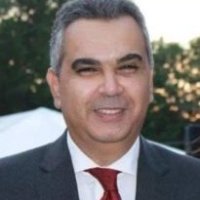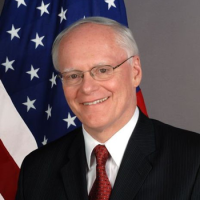The Gaza Ceasefire: What’s Next?
The Palestinian-Israeli conflict once again rose to the international agenda in May, as Israel and Hamas engaged in a bloody 11-day war. Following a tense confrontation between Israeli police and Palestinian protestors at the Al-Aqsa Mosque Compound, Hamas militants in Gaza fired long-range rockets toward Jerusalem. Over the next 11 days, Israel carried out airstrikes aimed at Hamas military infrastructure and Hamas fired rockets into Israel—at least 230 Palestinians and 12 Israelis were killed.
On May 21, the fighting stopped when a ceasefire mediated by the Egyptian government took effect. This panel included Ambassador Motaz Zahran, Ambassador of Egypt to the United States, to discuss Egypt’s role in brokering the negotiation and Acting Assistant Secretary Joey Hood to comment on the Biden administration’s reaction. The Washington Institute's David Makovsky joined to discuss his views based on recently completed travel to Israel and the West Bank. Chair of the Middle East Program Ambassador James Jeffrey discussed the geostrategic implications of the ceasefire and conflict.
Selected Quotes
Ambassador James Jeffrey
"The role of Iran in everything that is destabilizing in the region cannot be overemphasized. Hamas profusely thanked Iran for its support, not only diplomatic, but also, let's face it, in terms of weapon systems after the last crisis. Iran not only supports Hamas, it also supports even more radical extremist terrorist groups in Gaza, who are capable of blowing up ceasefires even when Hamas does seem to be willing to play, but it goes further than that. Israeli leaders and peoples throughout the region stress the danger of Iranian rocket and missile programs, be they in southern Lebanon, be they, increasingly, although they're under pressure, in Syria, be they elsewhere. We've even seen them in Iraq, and certainly in Yemen, striking targets throughout the region. Israel has to keep, when it is engaging on any Palestinian issue, particularly a military issue with Gaza, one eye focused on Iran."
“This is the nature of the Middle East that every administration has experienced. We can dream about pivoting to things that are geostrategically even more important—and I’m the first to admit that China is the biggest threat we face—but the Middle East is itself very important and it is very, very hard to ignore. I think that’s a lesson that everybody’s gotten.”
“I remain… optimistic. I think that we heard realistic plays forward. I think that the tenor of the international community and the states and actors and the region's reactions to this latest tragic outburst of violence has been notably different than what we have seen in oh so many other ones involving either Israel and the Palestinians, Israel and Lebanon, or other competitors in the region… The level of consensus throughout almost every country in the region on how to go forward, at least in general terms… is stronger than we have seen in a long time and I think that’s a basis upon which we can all build.”
Ambassador Mark Green
"There's no doubt that Egypt played a pivotal role in the mediation and communications that helped make the ceasefire possible. We all desperately hope the settlement is permanent or at least lasting. But we all fear that it could be fleeting. In other words, the future of the region remains uncertain and too often unsettled. While many of us have disagreements with the Government of Egypt on several fronts, on matters of human rights and civil rights, for example, we also must acknowledge the role that Egypt continues to play in trying to help strengthen and broaden the ceasefire."
Joey Hood
"We want to maintain the ceasefire, and try to deescalate the situation by avoiding destabilizing unilateral activities on all sides, and that includes incendiary balloons, it includes rockets, it includes airstrikes, it includes settlement activity, annexation of West Bank territory, demolitions of Palestinian homes, and all the rest, because we believe that those things just exacerbate tensions. We of course believe that Israel has an absolute right to defend itself, so we're not saying that if those rockets do come that they can't respond. They absolutely have to, of course, any nation would do that. But we want to avoid that sort of cycle of violence. So no unilateral destabilizing actions on either side."
"We will focus our efforts on an affirmative and practical approach that encourages constructive, positive steps that help keep the possibility of a negotiated two-state solution alive—and equally importantly, improves the lives of the Palestinian people and Israeli people in tangible ways."
"President Biden has been crystal clear in saying he, 'believes the Palestinians and Israelis equally deserve to live safely and securely, and enjoy equal measures of freedom, prosperity and democracy.' And the State Department is organized around this vision."
David Makovsky
"I do think that what we need to stress, in general, is the Abass succession in this whole context—that I think is like the 800-pound gorilla elephant in the room, so to speak. That Hamas feels that it's high as a kite because it wants to maximize its political leverage for the post-Abass period. And I think that's kind of the meta-story here. [...] What the Palestinian people in Ramallah, what they are saying to me is, David if they want in, we’re not trying to block them but we're just saying there's a price to joining this club, and that is you have to accept the agreements we've signed with Israel. And that means a diplomatic concession, and Hamas’ view is, no, we don't want to make any concessions, we want it all, because we feel we won, etc. And so, I think that is the context to a lot of this instability, is a belief that Hamas wants to be best positioned with the public, and with Palestinian institutions, on the eve of succession"
“Between solving the conflict and managing the conflict, there’s shrinking the conflict. I think you could shrink [the Isreali-Palestinian conflict], you could minimize the differences between the parties so it’s more bridgeable. You can bridge over a river, you can’t bridge over an ocean if the differences are so wide.”
“I think that the burden shouldn’t just fall on Egypt on a lot of this reconstruction [amid a wider US-led convergence on moving forward], but the Gulf [countries] should help as well.”
Ambassador Motaz Zahran
"Palestinians in Gaza cannot pay the price and the consequences of regular confrontations between Hamas and Israel. They are the overwhelming majority in Gaza. The population in Gaza is around 2,100,000. The overwhelming majority have no particular political affiliation. And they need to be catered to in terms of their needs, in terms of their livelihood. And this is part of, what we see in Egypt, as dissuading segments of the Palestinian society, and in Gaza, and providing the light at the end of the tunnel, and dissuading them from, you know, radicalization and extremist kind of approaches."
“The recipe to ease all of these conflicts throughout the [Middle East] region is by tackling the core conflict in the region. So, we would be doing ourselves… good, we would be doing the world good in terms of really focusing on the elements that would pave the way toward that kind of direct negotiation that we spoke about for the two-state solution to remain alive as the only viable solution for the conflict. We would see as a consequence the easing of so many conflicts throughout the region if we are able to tackle that main conflict that fuels radicalization and extremists throughout the region.”
“Pivoting away from the Middle East is [not] any option. And I think I’ve made a reference before that if you decide to leave the Middle East, the Middle East will never succumb to your decision… I think we’ve been very appreciative of the support the Biden administration has, and the road the Biden administration has shown in terms of supporting the efforts towards attaining a ceasefire. What we need to see is a continued role that is proactive.”
Speakers




Former ambassador to Iraq and Turkey, and Special Envoy to the Global Coalition To Defeat ISIS
Introduction

Moderator

Hosted By

Middle East Program
The Wilson Center’s Middle East Program serves as a crucial resource for the policymaking community and beyond, providing analyses and research that helps inform US foreign policymaking, stimulates public debate, and expands knowledge about issues in the wider Middle East and North Africa (MENA) region. Read more
